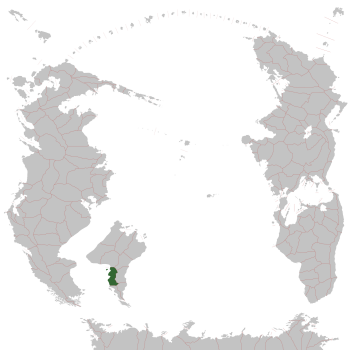Esfalsa (Pacifica): Difference between revisions
No edit summary |
(bugfix) |
||
| Line 129: | Line 129: | ||
}} | }} | ||
'''Esfalsa''' is a sovereign state located on the continent of [[Crabry (Pacifica)|Crabry]] in the [[South Pacific (Pacifica)|South Pacific]]. It covers an area of {{convert| | '''Esfalsa''' is a sovereign state located on the continent of [[Crabry (Pacifica)|Crabry]] in the [[South Pacific (Pacifica)|South Pacific]]. It covers an area of {{convert|65987|km2|sqmi}}, with a population of nearly 19 million. It borders [[New Crawford (Pacifica)|New Crawford]] to the north, [[Phanama (Pacifica)|Phanama]] to the northeast, and [[Alterra (Pacifica)|Alterra]] to the east, along with a maritime border with the [[Uaiekmıst (Pacifica)|Uaiekmıst]] territory of [[Techganet (Pacifica)|Techganet]] in the [[Transcrabrian Sea (Pacifica)|Transcrabrian Sea]]. Its capital and largest city is [[Ricubai (Pacifica)|Ricubai]], facing Portum Bay, and other major urban areas include Italedo, Loque, and Ogden. <!-- The geography of Esfalsa is characterized by flat, arable land, although the temperate climate also lends itself to many forests. --> | ||
Historians generally trace the emergence of an Esfalsan ethnic identity to around the 5th century BCE. Esfalsa itself was initially formed as a confederation of seven different kingdoms in 1043, reflecting increasingly close ties as a result of shared ethnic, cultural, and marital ties. The present [[Constitution of Esfalsa (Pacifica)|Constitution of Esfalsa]] was adopted in 1858, establishing a single, unitary republic, which remains in place today despite significant amendments and revisions. Among the most notable of these amendments is the Second Italedo Amendment of 1924, which installed a number of sweeping changes, including the establishment of the [[Chancellor of Esfalsa (Pacifica)|Chancellor of Esfalsa]] as the head of government and creating the present | Historians generally trace the emergence of an Esfalsan ethnic identity to around the 5th century BCE. Esfalsa itself was initially formed as a confederation of seven different kingdoms in 1043, reflecting increasingly close ties as a result of shared ethnic, cultural, and marital ties. The present [[Constitution of Esfalsa (Pacifica)|Constitution of Esfalsa]] was adopted in 1858, establishing a single, unitary republic, which remains in place today despite significant amendments and revisions. Among the most notable of these amendments is the Second Italedo Amendment of 1924, which installed a number of sweeping changes, including the establishment of the [[Chancellor of Esfalsa (Pacifica)|Chancellor of Esfalsa]] as the head of government and creating the present | ||
Revision as of 08:38, 21 November 2021
Esfalsa | |
|---|---|
Motto: Portus pro omnibus A haven for all | |
 | |
| Capital and largest city | Ricubai |
| Official languages | Austral |
| Ethnic groups (2020) |
|
| Religion (2020) |
|
| Demonym(s) | Esfalsan |
| Government | Unitary presidential directorial republic |
| Levi Herdes | |
| Legislature | Esfalsan Assembly |
| Senate | |
| Diet | |
| Formation | |
• Confederation | 1043 |
• Republic established | 1858 |
• Current constitution | 1924 |
| Area | |
• Total land area | 65,987 km2 (25,478 sq mi) |
| Population | |
• 2020 estimate | 18,793,005 |
• 2015 census | 18,679,062 |
• Density | 284.80/km2 (737.6/sq mi) |
| GDP (PPP) | 2020 estimate |
• Total | $1.18 trillion |
• Per capita | $62,617 |
| Gini (2019) | 27.4 low |
| HDI (2019) | 0.932 very high |
| Currency | Fallor (EFF) |
| Time zone | UTC-1 (CET) |
| Date format | mm/dd/yyyy CE |
| Driving side | right |
| Calling code | +33 |
| Internet TLD | .esf, .ef |
Esfalsa is a sovereign state located on the continent of Crabry in the South Pacific. It covers an area of 65,987 square kilometres (25,478 sq mi), with a population of nearly 19 million. It borders New Crawford to the north, Phanama to the northeast, and Alterra to the east, along with a maritime border with the Uaiekmıst territory of Techganet in the Transcrabrian Sea. Its capital and largest city is Ricubai, facing Portum Bay, and other major urban areas include Italedo, Loque, and Ogden.
Historians generally trace the emergence of an Esfalsan ethnic identity to around the 5th century BCE. Esfalsa itself was initially formed as a confederation of seven different kingdoms in 1043, reflecting increasingly close ties as a result of shared ethnic, cultural, and marital ties. The present Constitution of Esfalsa was adopted in 1858, establishing a single, unitary republic, which remains in place today despite significant amendments and revisions. Among the most notable of these amendments is the Second Italedo Amendment of 1924, which installed a number of sweeping changes, including the establishment of the Chancellor of Esfalsa as the head of government and creating the present
Esfalsa is a highly developed country, with a high-income economy powered by its status as a leader in several financial, agricultural, and technological sectors. Esfalsa ranks highly on the Human Development Index, with extensive government programs in education, health care, and other social services. It is a member of the World Forum, Cross Pacific Space Cooperation, and International Union of Football Associations.
History
Geography
Politics
Esfalsan government is a unitary, presidential directorial republic. Legislative power is vested in the bicameral Assembly, comprised of the Senate and the Diet. The Chancellor serves as the head of government, while the President of the State Council, a title that rotates annually among the seven-member council in order of seniority, serves as the head of state.
Since 1858, Esfalsa has been dominated by the center-left Liberal Party and the center-right Conservative Party. However, in recent years the New Democratic Party has grown in significance. In the 2018 Esfalsan elections, Levi Herdes of the New Democratic Party became the first chancellor who was not a member of either the Liberal or Conservative parties or their predecessors.